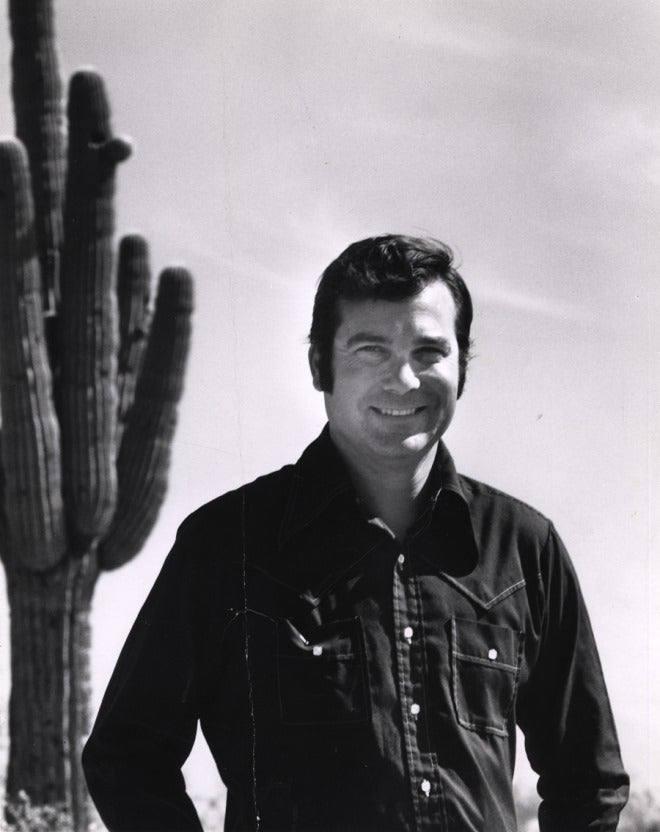Don Dedera, a journalist, author, Arizona historian and distinguished graduate of Arizona State University’s journalism school, died Tuesday at age 90.
Among many other achievements, Dedera was a foreign correspondent, Vietnam combat reporter, columnist at the Arizona Republic and editor of Arizona Highways. He graduated from ASU in 1951, one of the first students in the university’s journalism program.
Dedera wrote 23 books, winning national awards. His greatest coup came in the late 1950s, when he wrote a series of columns which resulted in the Power brothers being freed from prison after four decades serving sentences for Arizona’s deadliest shootout.
Donald Everett Dedera was born in Arlington, Virginia, in 1929. In 1946 he graduated from Washington-Lee High School in Arlington County, Virginia. He got his start in journalism while serving as a combat photographer in the U.S. Marine Corps from 1946 to 1948, right out of high school. One of his assignments was to document Chuck Yeager breaking the sound barrier in 1947.
After his discharge from the Marines Corps, he used the GI Bill to enroll at Arizona State College, the forerunner of Arizona State University, and graduated with a journalism degree in just three years. While at ASU, he also served as editor of the State Press.
After graduation from ASU in 1951, Dedera started as a general assignment reporter for The Arizona Republic. He became a daily feature columnist in 1953. In 1958, he won the Ernie Pyle Memorial Award for his work. He wrote for the Republic until 1969.
Over the next several years his journalistic and photographic talents were acknowledged by the Arizona Press Club and the International Association of Business Communicators. Dedera represented the Phoenix Press Club as president in 1957.
In 1958, while on a routine assignment to the Arizona State Prison at Florence, the warden introduced him to the pentitentiary’s two oldest inmates, brothers John and Tom Power. They had been convicted of murder in 1918, when they killed three members of a posse who went into the mountains to arrest them for draft dodging.
Dedera, then 29, was the star columnist for the Arizona Republic, cranking out 300 columns a year. He had one of the most recognizable names in the state. “It was a pain,” he told ASU Now in an interview two years ago. “That’s what celebrity is like.”
His columns riled many old-time Arizonans, resulting in a fiery parole hearing for the Powers two years later.
“I do not believe that anything in my life was ever more theatrically dramatic than the hour it took to process the second parole hearing that these two men had in April of 1960,” Dedera said.
There were about 200 people at the hearing. Dedera sat on the aisle about halfway. “I could feel the hot hatred bearing down on the back of my neck,” he remembered. “I’m the kid journalist that’s brought all this to pass.”
There was never a doubt to the parole board what to do, Dedera said. The next day they voted for commutation.
A week later, the Power brothers were released from the prison in Florence. Dedera waited at the iron gates.
The brothers walked out into the 20th century. John clutched a paper bag. Tom handed it to Dedera. Inside were a beautiful pair of handmade spurs inlaid with silver.
“We made parade spurs for you because we know you’re a dude,” Tom told Dedera.
The spurs sat on the mantelpiece in his living room in Payson.
In 1960, Dedera published his first book, "A Mile in His Moccasins." Dedera went on to successfully cover Europe and the Soviet Union and made two tours as a Vietnam War correspondent in 1966 and 1969. This service earned him an Alumni Achievement Award from ASU in 1975. “Some of us who have been in firefights know that there’s nothing in the world more unsettling to the human memory than that kind of desperate mortal combat,” he said.
In 1983, Dedera was appointed editor of Arizona Highways magazine. After leaving the magazine as editor in 1985 to pursue his first love of writing, he completed "A Little War of Our Own: The Pleasant Valley Feud Revisited." Dedera's prolific writing career continued with many more publications, a monthly magazine column, and accolades and awards that include the National Society of Arts and Letters Literary Award in 1988 and the Lowell Thomas Award in 1990. He was recognized in 2007 as part of the Arizona Culturekeepers program for his dedication to Arizona's history.
During his 60-year career Dedera published more than 2,000 journal and newspaper articles. His 1000th journal article was published in America West Airlines magazine in 1989.
Dedera is survived by his wife, Nancy. According to his wishes, no memorial will be held. His ashes will be spread in the Mazatzal Wilderness Area.
Top photo: Don Dedera at a campus luncheon for State Press editors, 2016. Photo by Deanna Dent/ASU Now
More Law, journalism and politics

CNN’s Wolf Blitzer to receive 41st Walter Cronkite Award for Excellence in Journalism
Wolf Blitzer, the longtime CNN journalist and anchor of “The Situation Room With Wolf Blitzer,” will accept the 41st Walter Cronkite Award for Excellence in Journalism, Arizona State University has…

Cronkite School launches Women Leaders in Sports Media live-learn program
Women in a new sports media program at Arizona State University got a solid game plan from a sports veteran at an Aug. 20 welcome event.“Be humble, be consistent and be a solver,” Charli Turner…

ASU center to host the Pursuits of Education and Excellence Symposium
The Center for the Study of Race and Democracy (CSRD) at Arizona State University is introducing the Pursuits of Education and Excellence Symposium as part of an ongoing initiative to commemorate the…

